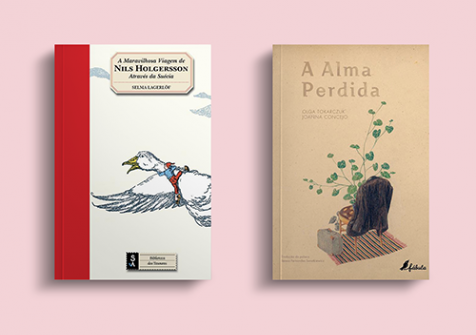Blog
23 of April of 2022
Does the virtual world give books the prominence they deserve?

By Ler é Essencial
2022 started with some discouraging news: in 2020, 61% of the Portuguese have not read a single book. This is one of several conclusions of the Inquérito às Práticas Culturais dos Portugueses 2020, commissioned by the Fundação Calouste Gulbenkian to the Instituto de Ciências Sociais da Universidade de Lisboa, confirming that the reading habits of the population are far behind what is expected, desirable and necessary. However, at the end of the first quarter, the hopelessness was slightly attenuated with the information released by Gfk, which made a study analyzing the behavior of the reading sector in nine countries. According to the consulting agency, the book sector experienced an increase of 16.6% in 2021, compared to the previous year.
But contact with Books is not limited to buying and reading. Nowadays, technology allows people to be in permanent contact with books and to have immediate access to what they need and what they are looking for. When visiting an online bookstore, you find a vast selection of books, promotions, and suggestions. In a quick search on informative websites, you can find a wide variety of literary events. In a thematic reading of websites and online magazines, reviews, and news about new books and writers. And, finally, a quick browse through social media, offers a plethora of reading suggestions. If in the first decade of the year, studies pointed out that a newspaper article was seven times more credible than a page of advertising, today we must consider that this new phenomenon of digital word-of-mouth has a great impact on the visibility of new titles, authors and, of course, the Book, placing itself as a source of information whose credibility is comparable to that of a newspaper report.
According to an IPAM study on Pop culture, released this week, 91% of people access websites, blogs, or social media to find tips on what they can read. Anyone who uses social media will easily find reading suggestions in the most varied formats. Be it photos, multimedia content or texts in posts, stories, reels or videos, books are waiting to be suggested and to be selected.
Social media, besides opening communication channels between companies and people, and people and companies, have brought people together. It is easy to find forums, channels, pages, and profiles with people with whom we share a passion for books and with which we are easily integrated. On the one hand, institutions (be they publishers, bookstores or libraries, among others) find in these spaces, through digital marketing, the possibility of maintaining an open and two-way dialogue space, with the dynamization of various activities: in addition to the promotion of titles, authors and events, it is possible to provide online meetings with authors and between readers, such as book clubs, or book launches that allow readers to attend remotely.
On the other hand, social media allows the consumer to have an increasingly active voice. Just as a special moment with friends is shared on various platforms, so the book emerges as an equally special suggestion that the reader is keen to share. Because the reader doesn't just read. They occupy their time with reading rituals, visits to bookstores and libraries, participation in events, online actions with other readers, participation in book signing sessions, and much, much more. These rituals are shared on various platforms and are the subject of enormous interaction by followers and users.
When we combine the technical opportunities that social media have brought, the reach they have and the impact they have on others with the enthusiasm that all those who contact with books on a daily basis have, we understand that books will continue to be very present in people's daily lives and that the actions carried out in what we call the real world are strengthened by what appears on the Internet. Who knows if this passion for the Book becomes one of the main trends on the Web and helps to correct the reading rates in our country? Whether in the short, medium or long term, the important thing is to have a union and concerted action in the dissemination of books so that, as Irene Vallejo states in the Manifesto pela Leitura, we can give books the protagonism they deserve.
2022 started with some discouraging news: in 2020, 61% of the Portuguese have not read a single book. This is one of several conclusions of the Inquérito às Práticas Culturais dos Portugueses 2020, commissioned by the Fundação Calouste Gulbenkian to the Instituto de Ciências Sociais da Universidade de Lisboa, confirming that the reading habits of the population are far behind what is expected, desirable and necessary. However, at the end of the first quarter, the hopelessness was slightly attenuated with the information released by Gfk, which made a study analyzing the behavior of the reading sector in nine countries. According to the consulting agency, the book sector experienced an increase of 16.6% in 2021, compared to the previous year.
But contact with Books is not limited to buying and reading. Nowadays, technology allows people to be in permanent contact with books and to have immediate access to what they need and what they are looking for. When visiting an online bookstore, you find a vast selection of books, promotions, and suggestions. In a quick search on informative websites, you can find a wide variety of literary events. In a thematic reading of websites and online magazines, reviews, and news about new books and writers. And, finally, a quick browse through social media, offers a plethora of reading suggestions. If in the first decade of the year, studies pointed out that a newspaper article was seven times more credible than a page of advertising, today we must consider that this new phenomenon of digital word-of-mouth has a great impact on the visibility of new titles, authors and, of course, the Book, placing itself as a source of information whose credibility is comparable to that of a newspaper report.
According to an IPAM study on Pop culture, released this week, 91% of people access websites, blogs, or social media to find tips on what they can read. Anyone who uses social media will easily find reading suggestions in the most varied formats. Be it photos, multimedia content or texts in posts, stories, reels or videos, books are waiting to be suggested and to be selected.
Social media, besides opening communication channels between companies and people, and people and companies, have brought people together. It is easy to find forums, channels, pages, and profiles with people with whom we share a passion for books and with which we are easily integrated. On the one hand, institutions (be they publishers, bookstores or libraries, among others) find in these spaces, through digital marketing, the possibility of maintaining an open and two-way dialogue space, with the dynamization of various activities: in addition to the promotion of titles, authors and events, it is possible to provide online meetings with authors and between readers, such as book clubs, or book launches that allow readers to attend remotely.
On the other hand, social media allows the consumer to have an increasingly active voice. Just as a special moment with friends is shared on various platforms, so the book emerges as an equally special suggestion that the reader is keen to share. Because the reader doesn't just read. They occupy their time with reading rituals, visits to bookstores and libraries, participation in events, online actions with other readers, participation in book signing sessions, and much, much more. These rituals are shared on various platforms and are the subject of enormous interaction by followers and users.
When we combine the technical opportunities that social media have brought, the reach they have and the impact they have on others with the enthusiasm that all those who contact with books on a daily basis have, we understand that books will continue to be very present in people's daily lives and that the actions carried out in what we call the real world are strengthened by what appears on the Internet. Who knows if this passion for the Book becomes one of the main trends on the Web and helps to correct the reading rates in our country? Whether in the short, medium or long term, the important thing is to have a union and concerted action in the dissemination of books so that, as Irene Vallejo states in the Manifesto pela Leitura, we can give books the protagonism they deserve.
ABOUT THE AUTHOR:
The campaign Ler é Essencial was developed by Bertrand Editora, with the primary objective of emphasizing the importance of books as an essential good and continuing to promote culture and healthy reading habits in our country. The Ler é Essencial campaign is a response to the difficulties observed in recent years with the exponential growth of the technological sector, namely social networks and streaming platforms, the low literacy rates in our country and the lack of support to encourage reading.




